REPRINTED WITH PERMISSION FROM THE CHRISTIAN SCIENCE MONITOR
Belting out a tune in front of strangers is a big ask for most people. CircleSinging participants regularly take that risk, and among their rewards are friendship and acceptance.
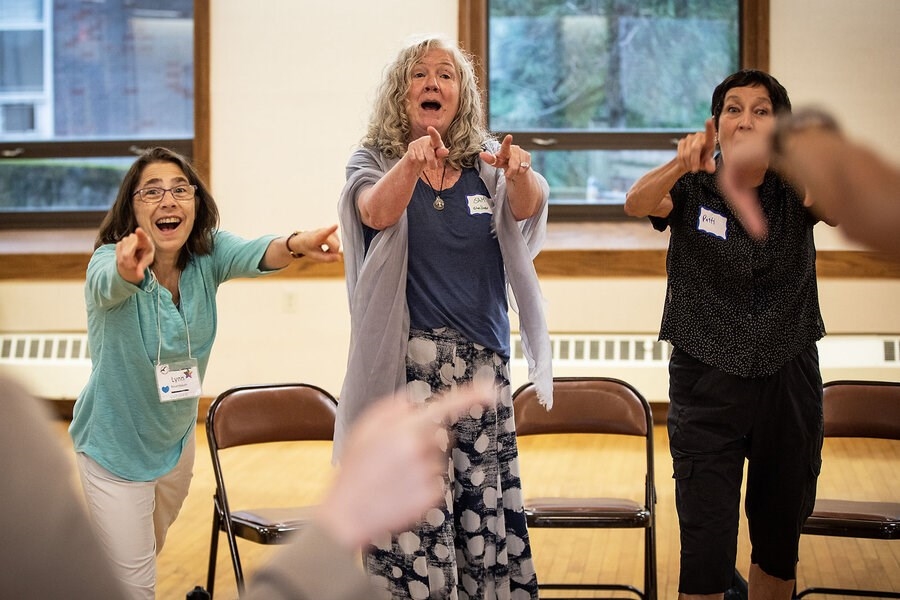 From left, Lynn Rosenbaum, Sam Whyte, and Patti Gurekian introduce themselves through song at a CircleSinging session at St. Mary Orthodox Church, Aug. 18, 2024, in Cambridge, Massachusetts. Melanie Stetson Freeman/Staff
From left, Lynn Rosenbaum, Sam Whyte, and Patti Gurekian introduce themselves through song at a CircleSinging session at St. Mary Orthodox Church, Aug. 18, 2024, in Cambridge, Massachusetts. Melanie Stetson Freeman/Staff
| CAMBRIDGE, MASS. - The song coming from the St. Mary Orthodox Church meeting room in Cambridge, Massachusetts, has never been heard before. And it will never be heard again.
Fourteen singers stand in a circle of metal folding chairs, improvising an organic cacophony of harmonious and discordant sounds. Some tap their feet, sway, or bob their heads to the rhythm – but no two people engage with the music in quite the same way.
In CircleSinging, there’s no sheet music, no director, no pitch pipe. There’s an art to it, but not a pretentious one.
“It’s really all about following. Following well,” organizer Peter McLoughlin explains to the group between exercises. Mr. McLoughlin is not a teacher or a director. He gently sets the group in motion, and then blends into the circle as a participant.
“Everybody’s welcome, and we’re not as concerned with whether you’re an excellent singer or you are an excellent harmonizer,” he says before the rest of the singers arrive.
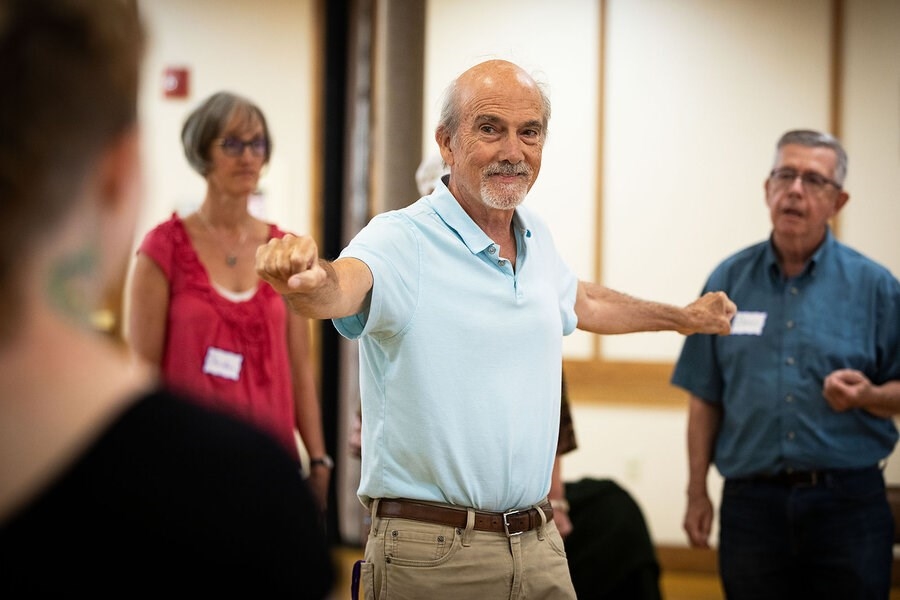 Melanie Stetson Freeman/StaffOrganizer Peter McLoughlin conducts a song during a CircleSinging meeting Aug. 18, 2024, in Cambridge, Massachusetts. He is not a teacher or a director, but gently sets the group in motion, then blends into the circle as a participant.
Melanie Stetson Freeman/StaffOrganizer Peter McLoughlin conducts a song during a CircleSinging meeting Aug. 18, 2024, in Cambridge, Massachusetts. He is not a teacher or a director, but gently sets the group in motion, then blends into the circle as a participant.
The Boston area’s CircleSinging community – tucked away in church meeting rooms in Cambridge, Arlington, Somerville, and the Jamaica Plain neighborhood – is part of an international network of CircleSingers who delight in the spontaneous art form.
The improvisational singing technique was developed by jazz musician Bobby McFerrin, best known for his 1988 hit song “Don’t Worry, Be Happy,” the first a cappella song to go No. 1 on the Billboard Hot 100 chart. Mr. McFerrin’s vocal jam sessions relied on a call-and-response model, in which a leader improvises one vocal part at a time and other singers repeat those “loops.” Any singer can volunteer to lead a composition.
Cambridge organizer Mr. McLoughlin started the first of the four Boston-area circles in 2015 on Meetup.com, inspired by Mr. McFerrin’s “magnificent” rendition of Psalm 23. The looping choruses and complex harmonies reminded him of the music surrounding his own Catholic upbringing. He was hooked.
Mr. McLoughlin learned the technique from Mr. McFerrin himself, attending his weeklong workshops once a year for seven years. Then CircleSinging Boston was born in Mr. McLoughlin’s living room.
Each of the four Boston groups, run by different organizers, holds two-hour meetings that prioritize openness. One Boston CircleSinger, Maureen Root, says her favorite exercise starts by singing a random word – not for its meaning, but for its sounds.
“So it’s like these different vibrations and things come out,” Ms. Root says. “It’s almost like you’re bypassing the mental circuitry. ... It gets me out of my self-conscious mind.”
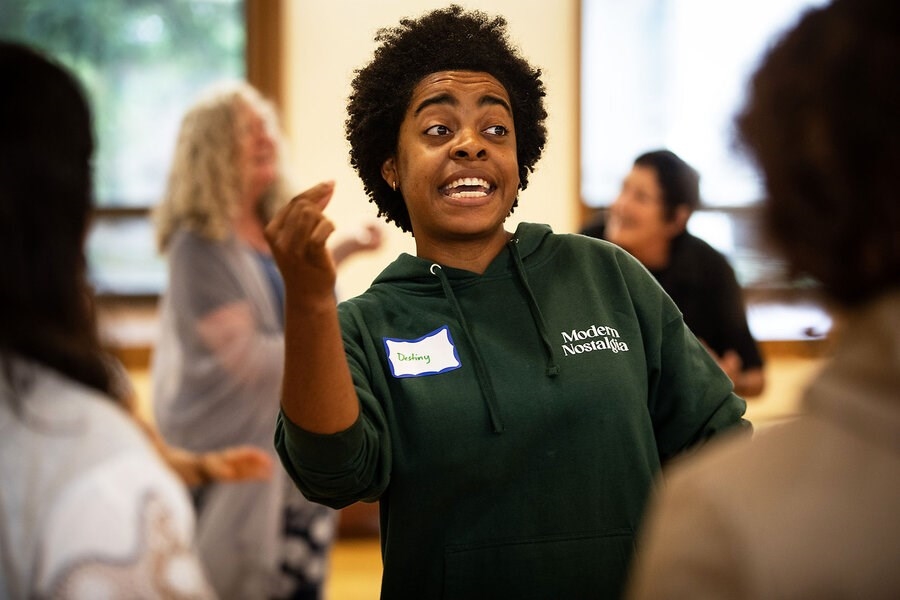 Melanie Stetson Freeman/StaffDestiny Cooper, a Boston Children’s Chorus conductor, guides a CircleSinging group in Cambridge, Massachusetts, Aug. 18, 2024. Ms. Cooper started attending CircleSinging events after college when she moved to Boston and didn't know anyone.
Melanie Stetson Freeman/StaffDestiny Cooper, a Boston Children’s Chorus conductor, guides a CircleSinging group in Cambridge, Massachusetts, Aug. 18, 2024. Ms. Cooper started attending CircleSinging events after college when she moved to Boston and didn't know anyone.
Some CircleSingers have no prior musical or singing experience, like Ms. Root, a retired medical technologist and yoga and meditation instructor of more than 30 years.
“To me, this is a really beautiful opportunity to observe one’s habits and tendencies and also how one interacts with groups,” she says.
Some singers vocalize with the roundness of choir vowels; others make primal noises with their mouths and tongues. During the July 14 circle, when one singer jokingly ad-libs in French in honor of Bastille Day, others giggle through their notes.
Less-experienced singers like Ms. Root share a circle with vocal professionals like Boston Children’s Chorus conductor Destiny Cooper, who moved to Boston after college, “knowing not a soul.” In experimental CircleSinging, a far cry from her familiar structured choirs, she found belonging.
“Most of the members are significantly older than me, but nonetheless, I think that community was really important to give me a sense of home,” Ms. Cooper says. Since joining the group about five years ago, she never missed a circle until the pandemic.
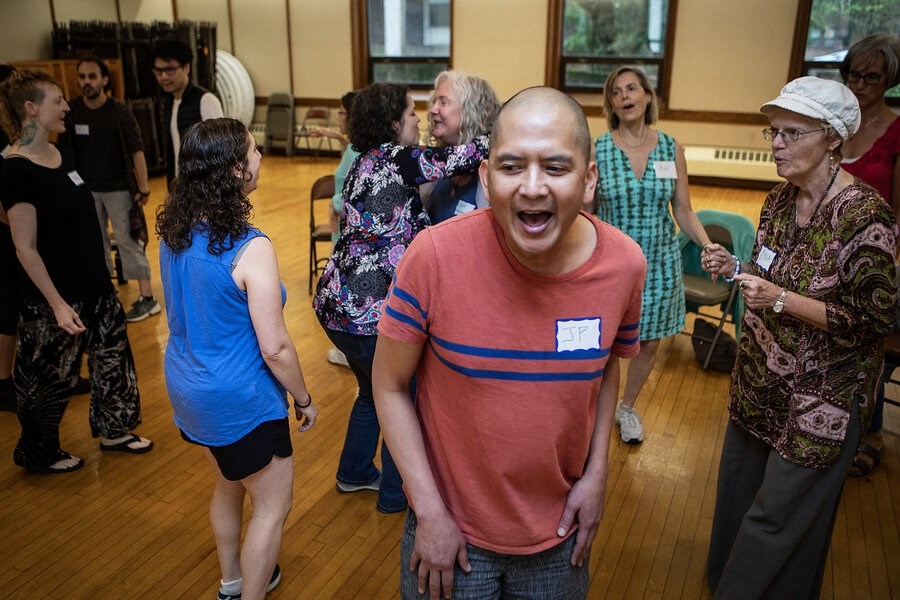 Melanie Stetson Freeman/StaffJ.P. Sevilla and others in a CircleSinging group meander inside the circle during one of the songs.
Melanie Stetson Freeman/StaffJ.P. Sevilla and others in a CircleSinging group meander inside the circle during one of the songs.
The singers have coalesced into an intergenerational network of friendship. While the group harmonizes, Rebecca Booth-Fox’s 5-year-old daughter dances around the perimeter of the room or occupies herself with coloring and stuffed animals. Many singers have known Ms. Booth-Fox since before her daughter was born.
“Seeing life changes – that’s what makes the group really special, and seeing people still come together with those life changes,” Ms. Cooper says.
Before and after having a child, Ms. Booth-Fox found “pure joy and pleasure and support” in CircleSinging, a rare free activity.
“It’s really nice to know that I was accepted and valued to just come as I am,” she says.
Arlington CircleSinging organizer Lynn Rosenbaum leads her meetups with all singers in mind.
“I tend to think of the arc of where we start and where we end, and bringing people along, building their confidence and their skills,” says Ms. Rosenbaum, a seasoned improv singer herself. “There’s usually a big difference between the beginning and the end, especially for new people – in their level of comfort and how much they’re willing to take risks.”
Just as singers of diverse experience levels are welcomed into the fold, so are singers of varied backgrounds, including those who are blind or have other disabilities.
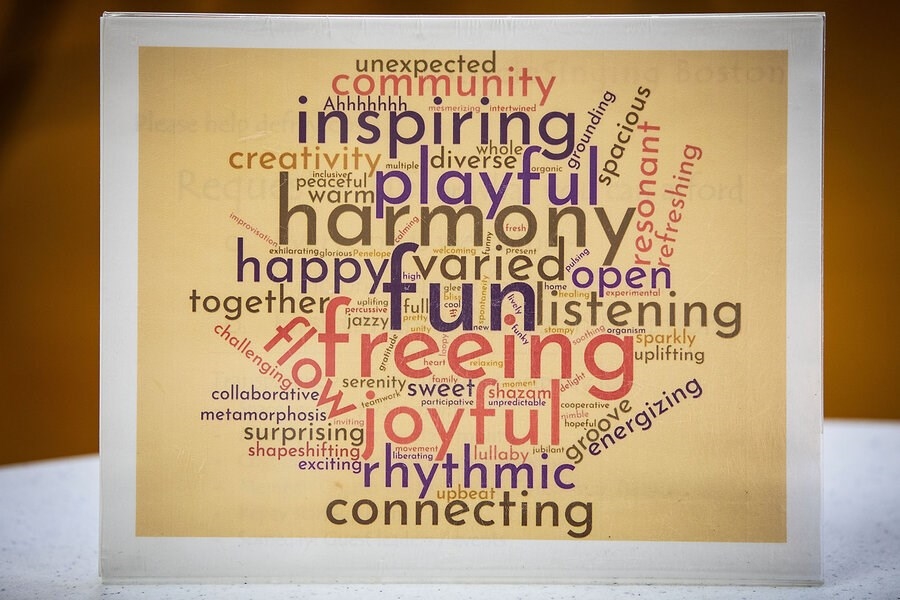 Melanie Stetson Freeman/StaffOrganizer Peter McLoughlin creates a "word cloud" with words that resonate with participants after a CircleSinging session.
Melanie Stetson Freeman/StaffOrganizer Peter McLoughlin creates a "word cloud" with words that resonate with participants after a CircleSinging session.
“Singing together and playing together – I say ‘playing’ as in ‘playfulness’ – it just creates a connection among people,” Ms. Rosenbaum says. “It’s a common denominator that we can all connect to.”
Ms. Rosenbaum kept the group alive during the pandemic by organizing virtual circles.
“[CircleSinging is] just this opportunity to express our full range of emotions and letting it out through our voices and our bodies,” Ms. Rosenbaum explains. “There’s not always a lot of opportunities in everyday life to do that, so this creates a safe space for people to be silly and explore and take risks and express joy.”
Page created on 8/23/2024 1:41:52 PM
Last edited 8/23/2024 1:55:28 PM
